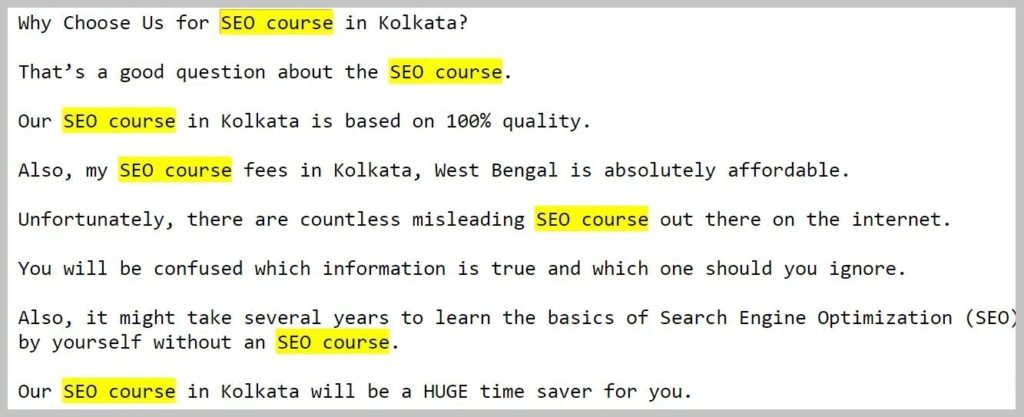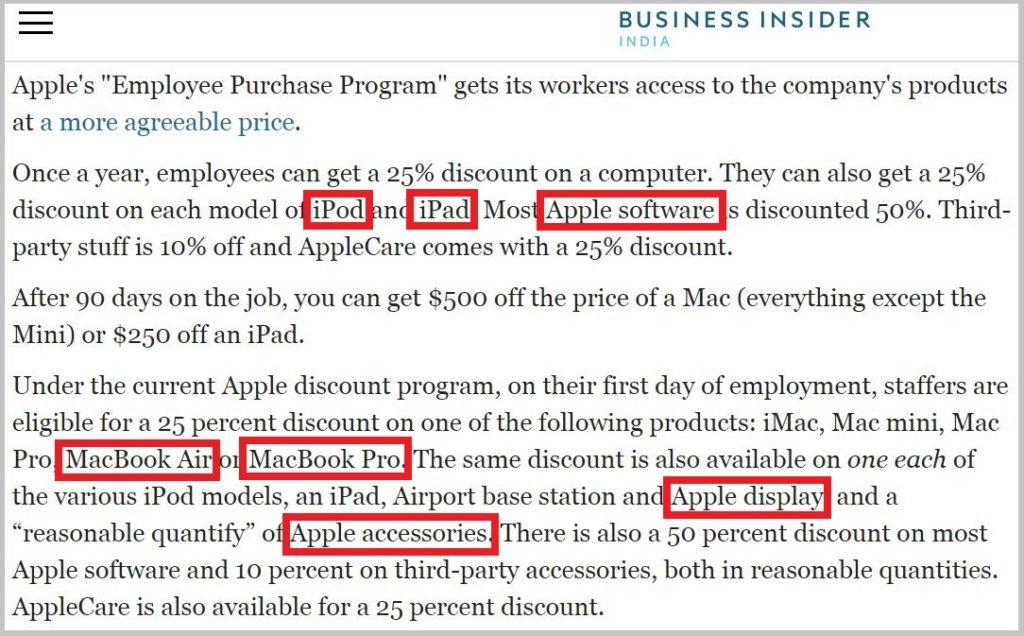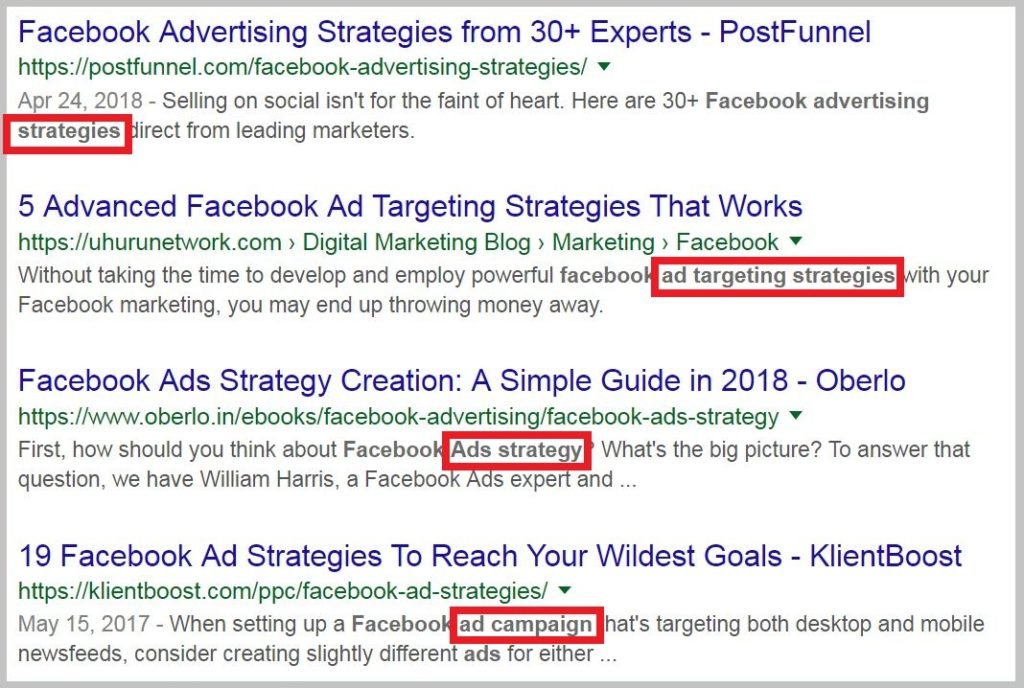In this article, you are going to learn everything about keyword stuffing in SEO.
(Including how to avoid keyword stuffing in 2024)
[With examples]
Are you ready?
Let’s get started…
What is Keyword Stuffing in SEO?
Keyword stuffing is the process of jamming a webpage’s content with keywords.
(Again and again, without any context)
It’s a blackhat SEO technique.
For example:
Let’s say, I’m writing content about the SEO course in Kolkata for beginners.
…And my primary seed keyword is SEO course.
I have written a 2000 words content and included the primary keyword 100 times…
And I have added the keyword where it doesn’t require (included forcefully)…
Here is an example:

This technique is called keyword stuffing in SEO.
Needless to say:
| Google and readers both HATE this technique. |
Look:
Google is super smart today…
You can’t spam your content with keywords.
It is against their guidelines.
According to Google:
| “Filling pages with keywords or number results in negative user experience, and can harm your site’s ranking.” |

Sadly, a large number of people still think that:
“If you include a keyword lots of time [stuffing] on a page, the ranking will climb in Google.”
This is a big myth in SEO…
Yes, this technique might have worked earlier [When Google wasn’t smart]…
But today:
It’s a myth…
History Of Keyword Stuffing
A few years ago SEO professionals were heavily using keyword stuffing techniques.
Those were the days when search engines were not smart enough.
They strongly depended on the exact match keywords on a page.
Google and other search engines used to rank those pages which had exact match keywords.
For example:
Back in the day, if someone searched for “What is SEO” in Google…
…Google ranked those pages which had the exact match keyword [What is SEO] in the title, body content…
But today?
The picture has changed completely…
So, does keyword stuffing work now?
In short:
This black hat technique doesn’t work…
Note: In most cases, high-quality content doesn’t stuff with keywords. That means quality content creators mainly focus on creating useful content instead of thinking about keyword stuffing.
Why Keyword Stuffing Doesn’t Work Today
You might be wondering why is keyword stuffing bad?
The reason behind this is:
Google started noticing that content creators were writing articles without providing any value to the readers.
Their main objective was to inject keywords after keywords in the content to rank high in Google.
This technique worked at that time…
However, with the release of the Hummingbird algorithm, everything got changed.
Now:
Instead of just looking for exact-match keywords, Google now clearly understands the intent behind a searcher’s query and ranks pages which match that search intent.
For example:
If you search for “how to do SEO for website” in Google…
You will get these results:

If you notice none of the top-ranking page’ title has the exact search phrase [how to do SEO for website]…
Still, Google is able to understand the intent of this search term…
[The intent here is “SEO tips”]
Here is another example:
This will show you how the Hummingbird algorithm changed the whole SEO picture.
Search with “what is online marketing” in Google…
…And you will notice that Neil Patel’s article is ranking on the first page:

The surprising thing is:
The key phrase “what is online marketing” isn’t present anywhere in this article.
Here you can see:

The simple reason is, now Google can understand the actual intent of search queries.
Thanks to Google Hummingbird Algorithm 🙂
If someone is searching “what is online marketing”, Google understands that the searcher is actually looking for an in-depth guide about online marketing.
So:
It’s clear that Google keyword stuffing doesn’t work today.
Today, content writers have to optimize their websites with natural writing rather than forced keywords.
How to Avoid Keyword Stuffing in SEO
Following are a few easy ways to avoid keyword stuffing in 2024:
| Try our highly engaging link building services in India. |
Tips #1: Keep the Keyword Density Under Control
But first:
What is Keyword Density in SEO?
keyword density is the number of times a particular keyword or phrase appears compared to the total number of words on a webpage. The formula is calculated in percentage.

For example:
If your page has 100 words and a keyword used 10 times…
So, the keyword density is 10%.
To be clear:
There is no optimum keyword density number. Just use the keywords a handful of times and you are set.
However, most SEO experts recommend keeping the keyword density between 1-3 percent.
| Note: I personally don’t overthink about keyword density. I just try to write in-depth content that will satisfy user intent. I include my target keywords a few times…
That’s it… |
Tips #2: Use LSI Keywords [Make Google and Readers Happy] 🙂
LSI keywords stand for Latent Semantic Indexing keywords.
In other words: Closely related words…
Today Google doesn’t care how many times you included a keyword in your content.
Instead:
It pays close attention to LSI keywords.
Why?
Because these LSI keywords help Google to understand the topic of a page.
[Completely]
For example, let’s say you write an article optimized around the keyword “Apple”.
How does Google know whether your page is about:
|
The simple answer?
LSI keywords.
For example, when Google sees a page with LSI keywords [closely related words] like this…

…they know the page is about Apple the company.
So:
You don’t need to include your target keyword repeatedly…
This helps to avoid keyword stuffing.
Okay, this technique is cool.
But:
How to find LSI keywords to avoid keyword stuffing?
It’s easy…
Search for your target keyword in Google…
| Pro Tips: Perform keyword research using Google suggest and get a list of closely related terms (FREE) |
[“how to start a business” is target keyword here]

Just scroll down to the bottom of the search results.
[Searches related to… section…]

These bolded terms along with your target keyword are LSI keywords.
Include the most suitable terms in your content.
…And your job is done 🙂
Tips #3: Include Synonyms [A Smart Technique]
One of the best ways to avoid keyword stuffing is:
Add synonyms of your target keyword into the article.
For example:
If your target keyword is “SEO Techniques”.
Include synonyms like “search engine optimization techniques”.
Cool 🙂
This helps Google to understand the topic of your page.
[With confidence]
Now you might be wondering:
How to find synonyms of your main keyword?
It’s very simple…
Let’s say your target keyword is “Facebook advertising strategy”.
First, search for your target keyword in Google…

…And scan the first page results.
Look for bold words and phrases [which aren’t your main keyword].
Here are some examples:

Google makes these terms bold [strategies, Ads, ad campaign] because they think these are VERY similar to the keyword you just searched for.
Finally, you need to include these bold terms in your content…
And you are set…
There is another awesome way to get synonyms of your main keyword in Google…
Here is how:
Say your keyword is “Facebook promotion”.
You need to use the following search string in Google:

…And Google will help you to get the similar meaning terms.
Like this:

So:
Instead of using your main keyword “Facebook promotion” again and again in the article, you can use the following keywords…
|
These techniques will help you to stay away from keyword stuffing.
…And make Google and readers love your content.
Awesome 🙂
Now It’s Your Time
I have shown you what is keyword stuffing in SEO.
…And how to avoid keyword stuffing.
Now, I want to know:
Do you have any suggestions on Google keyword stuffing?
Or…
Do you have any questions…
If so, leave a comment below right now…
I’m waiting 🙂











7 Responses
Your article is really helpful and easy to understand the keywords stuffing..
But I have a question while reading I had worked on lots of event blog I had saw that Keyword stuffing in still working for short term blog we had generated lots of traffic from keyword stuffing…
Google may penalized you for doing keywords stuffing but its still work on short term blog…
Hi Ankit,
Thanks for your comment.
Here is my answer about your thoughts:
https://www.seroundtable.com/google-keyword-stuffing-penalty-not-25944.html
Excellent, what a blog it is! This webpage presents valuable data to us, keep it up.
Nice article. Full of information. It makes clear about what is keyword stuffing and how to avoid it and why, to me. Thanks for this.
Thank you for your appreciation.
Really informative, thanks for sharing this!
I really benefited from this good idea, thanks